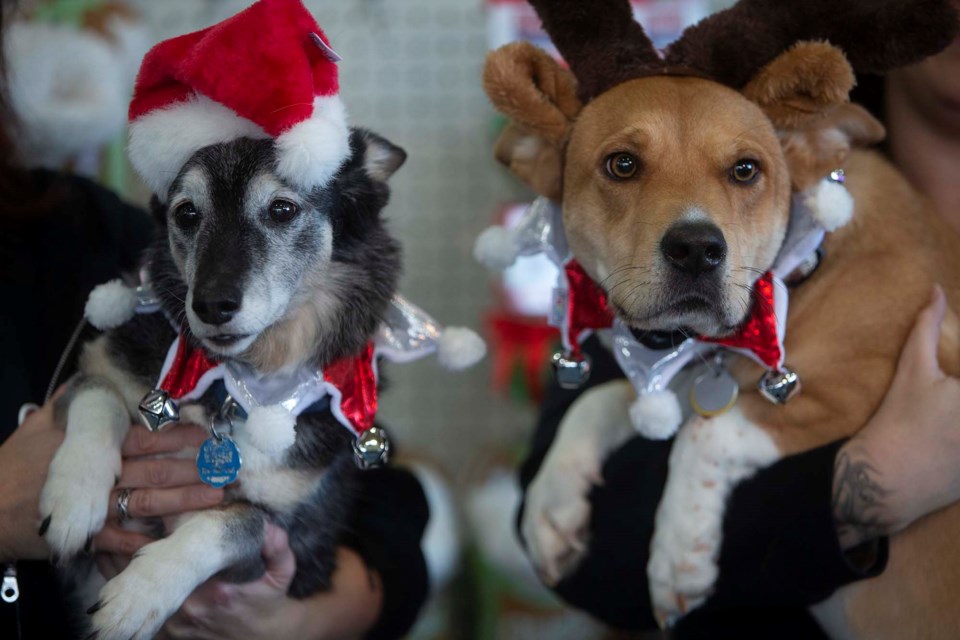Christmas Pet Poem
‘Tis a month before Christmas, and at the North Pole
Santa plays a critical role
As Christmas approaches and travel draws near
He puts on his gloves and checks the reindeer.
Are they healthy for flight?
Pulling nonstop through the night.
Flying is easy for joints and hooves,
But what about the stress of landing on roofs?
And do their fur coats carry tiny mites,
That give children painful, scratchy bites.
Santa checks if his deer are injured or sick,
That’s part of the job for mighty St. Nick
Have you done your share?
To show the same care?
Is your pet excited for all that cheer?
Give it some treats but avoid the beer.
Being safe at home is the best bet
To keep from visiting an emergency vet.
The countdown to Christmas is underway and we all want our pets to enjoy the festive season as much as our two-legged guests. However, holidays can be hazardous for pets, with many potential dangers in the form of everything from alcohol and chocolate to poinsettias and raisins in meat pies.
The holiday hustle and bustle is always an exciting time as families decorate a tree, make and/or wrap gifts, ramp up the baking, and receive more guests. Pets prefer routine, and when the household is disrupted, there is potential for the unexpected to happen.
If you feel stressed out, so will your pet. It is during these times their behaviour may change, such as chewing on plant leaves or pawing at electrical cords they never touched before.
Alberta Animal Health Source and the Canadian Veterinary Medical Association have posted a series of suggestions to avoid having to rush your pet to an emergency veterinarian. Surgery, which is expensive, is a final resort and sometimes the only one.
Food
• Alcohol: Dogs may be attracted to alcoholic beverages, but alcohol is toxic to their nervous system. Animals become drowsy, unco-ordinated, depressed, disoriented, develop respiratory failure, and lose consciousness. If alcohol ingestion is suspected, call a veterinarian immediately.
• Chocolate: The creamy chocolate humans love so much is poisonous to dogs mainly because it contains theobromine, a bitter ingredient in cacao. Dogs are unable to metabolize theobromine like humans can. Anything containing chocolate should be kept locked away.
• Turkey bones and fatty table scraps: Traditionally families avoided waste by feeding turkey bones to pets, however, in the chewing process, bones splinter and can become stuck in the throat or puncture the esophagus, stomach, or intestines. Feeding pets fatty table scraps over a lengthy period of time can also cause pancreatitis.
Household items
• Candles: Hanukkah is a deeply spiritual Jewish festival enjoyed with celebratory candles. Keep them high enough to avoid dogs with wagging tails from knocking them down.
• Christmas trees: The tree is a Christian must-have symbol of the season. But trees with prickly needles, wire hooks, glass ornaments, and shiny ribbons are especially hazardous. Cats love dangling tinsel and ribbon, but if eaten it can cause blockages in intestines and require immediate surgery. An animal quietly hiding under the tree could be chewing on an electrical cord that potentially causes electrocution.
Also, make sure the tree is anchored properly. A cat attempting to climb the tree could injure itself while falling. In addition, stagnant tree water is a breeding ground for bacteria. It can cause bowel irritation and should be avoided at all costs.
• Plants: Holiday plants, although beautiful, are irritating to pets’ mouths or stomachs. Holly, mistletoe, and poinsettias can cause mild to whole-body symptoms that include vomiting, diarrhea, low heart rate, temperature, difficulty breathing, unsteadiness, and excess thirst and saliva. The most serious symptoms are seizures, coma, and death. If any symptoms appear, call a vet immediately.
• Antifreeze: Different vehicles may visit your home during the holiday season and it’s a good idea to check for leaking antifreeze. Antifreeze (ethylene glycol) has a sweet taste and both dogs and cats will lick it. It is fast-acting and causes kidney failure. Just one teaspoon for cats and one tablespoon for dogs can be fatal. Some snow globes also contain anti-freeze.
Anyone with concerns or who sees their pet behaving out-of-character should call a vet immediately.



